








































Dennis B (not his name) is facing a trifecta of misery: house in foreclosure, mother recovering from cancer, and possible deportation to the Philippines if Donald Trump moves ahead with plans to send to their countries of origin 11 million undocumented immigrants.
When The FilAm called, the former caregiver was bubbly as always and sounded upbeat and positive. He tried to sound positive and make jokes, a common Filipino trait exhibited by those who are usually on edge.

Staying positive, he said his house in New Jersey has a number of interested buyers, and his mother’s cancer appears to be in remission. The deportation remains up in the air, but his Faith is stronger than Donald Trump, he said. “Alam ko, God is in control. The Bible says kings and leaders are nothing. It’s God who allows everything.”
Dennis came to the U.S. in 2010 and lived with his mother in the Garden State. He had no legal status, but it did not bother him at the time because he was younger, had a job, and lived with his mom in her comfortable three-bedroom home.
Circumstances have changed when
Founding Editor
Cristina DC Pastor
Managing Editor Rene Pastor
Address
P.O. Box 8071
New York, NY 10116
his mom was diagnosed with a type of rare cancer that required extended hospitalization. Her income from the mall is greatly reduced as she works only two times a week. As for Dennis, an accident at work sidelined him when he tried to save an elderly patient from falling off his wheelchair. That’s when mother and son decided to sell their home to pay the bills.
The looming deportation is giving Dennis sleepless nights. During the campaign, he thought it was all bluff and bluster from the presidential candidate because he seemed to enjoy the game of shock and awe. But recent
news of raids in Chicago and the seafood depot in New Jersey made it all real for Dennis.
Although he lives far from the seafood depot in Newark, the fact that ICE agents are now crawling in his state has added to his anxiety. He wondered: How will they do it? Will they go door to door? Will they send us to detention or send us straight to a military plane?
While he has come around to the idea of possibly going home to his siblings, his U.S. citizen mom is adamant on staying in the country. Dennis thinks he would have to stay to look after her because of her age.
“I wouldn’t say I’m fearful, but maybe concerned,” he said, sharing with The FilAm how he feels.
When he leaves the house, he says he makes sure to always look around and behind his back. He stays home most days except when there are urgent errands like grocery shopping, going to the pharmacy for his mom’s medicine, and attending Sunday mass. Yes, he has never missed a Sunday communion with the Lord.
“I don’t watch the news much,” he said. “It upsets me.”
He said being sent home forcibly is something that may or may not happen but whatever it is, “I’m ready,” he said.
– Cristina DC Pastor
Marissa Bañez
Tricia J. Capistrano
Joel David
Wendell Gaa
Allen Gaborro
The FilAm is a publication of A&V Editorial
Maricar C. Padilla
Angelito Cabigao
Ludy AstraquilloOngkeko
Lindy Rosales
BY CRISTINA DC PASTOR
“St. Denis Medical” is the latest hospital series to hit primetime television.
But instead of being a medical drama like “ER” or “Grey’s Anatomy,” SDM is a sitcom about a smalltown Oregon hospital with Filipino nurses among the main characters and the so-called Filipino Mafia as their hospital Superpower.
“It’s funny,” said Arman David, a post-anesthesia care registered nurse (RN) in Jersey City. “I have not watched St. Denis Medical (in full) but I have seen some clips. We are really known as the ‘Pinoy Mafia.’”
The term “Filipino Mafia” may sound disparaging to some Kababayan in the nursing profession but it can be a form of compliment to others. It indicates a quiet strength that our nurses possess. By their sheer number, their outstanding bedside skills and care toward patients, and their professionalism they command both power and respect in busy hospital corridors. American hospitals and nursing homes are believed sta ed 80 percent to 90 percent by Filipino nurses.
Such power comes down to visibility. Filipino nurses are at every floor, unit and department. They bathe patients, insert catheters, give medicine, assist in surgeries, and develop care plans. They are also the nurse managers and executives who communicate with the families. They seem to know one another and can be flexible and uncomplaining when transferred to other departments or given a di erent shift assignment. They are usually overworked, like most nurses across-theboard, yet maintain a pleasant disposition. The younger ones can count on the support of long-time nurses who will mentor them and show them the ropes.
It was comedian Michael Che of SNL who called out the TV industry’s snub of Filipino nurses during the 2018


Emmys: “Can you believe they did 15 seasons of ‘ER’ without one Filipino nurse? Have you been to a hospital?”
The sitcom SDM premiered on November 12, 2024 on NBC. The main character is Rene, a cocky, judgmental and gossipy male nurse who seems to be the leader of a clique of Filipino nurses. They are, according to a character playing an American head nurse, “like the Filipino Mafia.”
“They’re like the Filipino Mafia,” whispers the nurse character avoiding being seen as racist.. “Hospitals can feel like high school. There are cliques
and hierarchy and Mean Girls and I’d say Rene is definitely the Regina George. You just don’t mess with them.”
Retired psychiatric RN Darlene Borromeo is a fan of the show.
“Of course there's going to be opinions from our nurses but the fact is we're here, we run the show whether we like it or not,” she said. “I am all for it, famous or infamous. I hope ‘St. Denis Medical’ will go on for many episodes.”
RN Maricar Tangonan, an MDS (Minimum Data Set) coordinator in Westchester County, said she is not too happy about the character of Rene – played by actor Nico Santos -- as a bully.
“The portrayal of the Pinoy nurse leading the clique at St. Denis Medical as a bully doesn’t sit well with me. I don’t believe most nurses educated in or from the Philippines would act that way on the floor,” she told The FilAm.
While she understands SDM is comedy and that “I shouldn’t take it personally, as a nurse myself, I feel disappointed by this character’s role. That said, I’m still glad to see Filipino nurses finally getting representation in medical shows.”
It is a comedy, maintained Borromeo. She, however, wished SDM and TV medical dramas would also “shed light” on the courage, dedication and stories of heroism of Filipino nurses.
“We have many stories! From calling each other Dai and interpreted by Americans as ‘They're dying,’ to gross stories only we could tell. You can't make that up. We have stories of death and dying, of heroism,” she told The FilAm.
SDM appears to be gaining a following judging from feedback, some from nurses’ families themselves.
“I haven't seen a funny medical show like this since ‘Scrubs.’ I love the blend of humor and accuracy,” writes @MagnumNYC.
Writes Anthonyqty2115: “It's true though, Filipino Mafia everywhere but instead of crime... it's gossiping!!!!!”
@AleiatheEnchanted writes: “This is what my nursing classmate said a few years ago when I was a student. We went to do our clinicals at a hospital filled with many Filipino nurses. He was like I want to join the Filipino Mafia. I was like what? And then I knew what he meant lol.”
“Proud son of a Filipino Mafia Donna here. Can confirm it's true,” posts @pogimax.
When Filipino American actor Lou Diamond Philips arrived for The Loida Lewis Podcast, I was starstruck. He looked like a distinguished professor, with silver streak in his hair and on his beard, still handsome as he has always been.
His breakout film “La Bamba” in 1987 was the bio-pic of Ritchie Valens, who died in a plane crush with Buddy Holly on February 3, 1959. The tragedy came to be known as “The Day The Music Died” made famous in the Don McLean song “American Pie.”
Lou Diamond Phillips gained international fame for his impressive portrayal of Ritchie Valens with his singing accompanied by his guitar playing. He auditioned for the role of Ritchie Valens in Dallas having already graduated from the University of Texas at Arlington. He was at the time working at the Film Actors Lab as a teacher.
When he won the role, he had one week to learn the script, play the guitar, memorize and sing 16 songs. He was paid $6,000 for that break-out gig but it jumpstarted his career as a movie star.
Lou Diamond Phillips was born of a Zambalesborn mother and American father Gerald Upchurch on February 17, 1962, at the U.S. Naval Base in Olongapo in Zambales province. When his father died, his mother remarried George Phillips who adopted Lou Diamond. He was named after a famous military hero named Lew Diamond who served in World War II. Instead of Lew, his first name was spelled Lou for his mother Lucy. He grew up with his real name -Lou Diamond Phillips -- not a Hollywood made-up name.
From Zambales, the family was stationed at many bases until they finally settled in Corpus Christi, Texas in 1974 when he was 12. He finished his Bachelor of Fine Arts in Drama from the University of Texas. Lou Diamond excelled in acting at the university. When he started winning awards for his talent, that was when he got called to audition for the role of Ritchie Valens. After initially auditioning in Dallas, he was flown to Hollywood for a screen test.

“La Bamba” was followed by “Stand and Deliver,” a true story of a math teacher named Jaime Escalante with his math students in a predominantly Latino area of Los Angeles. Lou Diamond played one of his students. The film won the Independent Spirit Award for Best Feature in 1988. Then came “Young Guns” with


a superb cast of the Brat Pack era, including Charlie Sheen, Emilio Estevez, and other popular actors of the ‘80s.
His most recent films are “The 33” about the Chilean mine disaster where he co-starred with Antonio Banderas, the Jo Koy comedy “Easter Sunday,” and the thriller “Werewolves”.
On television, he was in the series “Prodigal Son”, “Longmire”, and had guest appearances in “Blue Bloods,” “The Ranch,” “Brooklyn Nine-Nine,” among other shows.
On Broadway, he won a Tony nomination for Best Actor in his role as the King in the revival of “The King and I”. He has also written screenplays for “Ambition,” “Trespasses,” and “Burning Desire.”
Four years ago, Lou Diamond’s first fantasy novel for Young Adult “The Tinderbox: Soldier Of Indira” was published. It is a Romeo and Juliet type story based on Hans Christian Anderson’s fairy tale “The Tinderbox.” A cross between “Star Wars” and “Game of Thrones,” it has an exciting storyline with wonderful illustrations by Yvonne Phillips, Lou Diamond’s wife. They have a daughter named Indigo.
Last November 2024, Lou Diamond published the sequel to the first book, “The Tinderbox: Underground Movement,” again with illustrations by Yvonne Phillips. Although it is a sequel of the first book, anyone could read it as a stand-alone.

I cannot wait for the two books to be brought into animation, to be transported into the world of Indira inhabitant by people who were dark skinned and Mano where the inhabitants looked fair with blond hair.
“The books might become a limited series which may or may not be animated,” he said.
Lou Diamond writes in easy to digest manner that young adults and readers of fantasy tales will enjoy.
The Loida Lewis Podcast features Lou Diamond Phillips in Episode 5 of Season 2. It is available on YouTube.
It is still winter in New York and if you perhaps sometimes catch yourself dreaming of languid days in the Philippines, they will be filled with the golden sun, the warm sea, and of course the island cuisine that makes the Philippines the land of our hearts.
There’s a book that takes you back to nostalgic times in the Philippines, a little escapism that brightens up a bit of our wintry New York lives.
“100 Years: Recipes from an Archipelago” written by Ann Marie Manhart is worth a read. I got to know Ann Marie from the grand dame of Philippine Cuisine in America, Amy Besa.
Ann Marie is an Austrian citizen who permanently resides in Vienna. But In February this year, she comes to pay New York a visit, a state she lived in for a few months in the `90s, furthering her culinary prowess at the Culinary Institute of America in Hyde Park.
She writes about her childhood in the Philippines growing up in her grandma’s restaurant in Pangasinan which is turning 100 years old in 2028. Her book is a veritable treasure chest of much-loved Filipino family recipes.
She recounts that these dishes are cooked in their family restaurant where the produce is as close to the source as possible. The milkfish, prawns, crabs, squid were just caught a few hours before they reach Dagupeña Restaurant’s kitchen. The vegetables are from local farmers or backyard gardeners. The meats are from small-scale farmers. And sometimes, the fish they serve are from their own fishponds as well. Each recipe comes with an accompanying story, about family, the origins of the dish, the provenance of the ingredients.
It is a heartwarming story of a family with humble if not impoverished beginnings, who overcame challenges by hard work, an uncompromising food philosophy, and the love for entertaining and making their guests feel at home. It is also the story of how the Philippines is today; how it evolved, as seen through the lens of a young girl, now a woman who has made another country her

home, but still feels very much connected to the place where she was born. It is perhaps a sentiment we all share as Filipino Americans.
Asked about why she wrote the book, Ann Marie says that she wants the children of the diaspora, like her own child, to have an insight on how it is to grow up in the Philippines and mostly to know what people ate, how people treated produce, the philosophy behind our cuisine. She opined that it can be an additional basis for the Filipino cuisine we cook in our own kitchens, with foreign ingredients.
An example she gives is when she cooks sinigang in Vienna, which she doesn’t do with mixes.
“I just based it on my grandma’s 1928 recipe. Except, I use local fruits like apricots. Apricots turn sour upon cooking. All you need to do is put a few of the de-seeded fruits in the pot, that you don’t even need to strain the sinigang broth after.”
She further opines that Filipino cuisine can be adapted to anywhere one lives. You just need to learn about the local ingredients that are alike or that will produce similar results to the ones our ancestors used, and you will have spectacular results.
Asked what brings her to New York, she says: “I want to show my son New
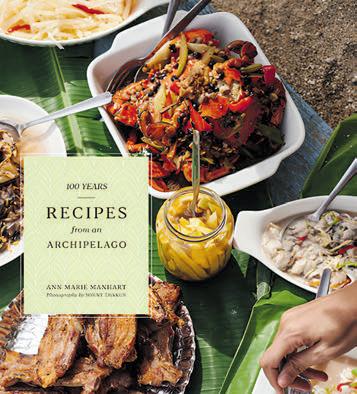
‘100 Years: Recipes from an Archipelago’ Ann Marie Manhart
September 2023
184 pages
York, the city I wanted to live in. I wanted to move here several times. But fate had di erent plans.”
After her culinary studies in New York, she went back to Manila where she did the rounds of fine dining restaurants and then eventually spent eight years teaching culinary arts and entrepreneurship at the School of Hotel and Restaurant and Institution Management of the College of Saint Benilde. It was also during those times that she took up her MBA and then started producing vacuum packed marinated milkfish products in her home province Pangasinan. After dealing a lot with fish harvests and a challenged
environment she decided to set her sights on environmental studies.
“I applied at Columbia University, but I got waitlisted and was urged to apply for the next year. So, I said, I would do my environment studies in Vienna where my then boyfriend, now husband lives. I stayed put.”
After her studies, she ran her own consultancy firm for five years. The firm dealt with resource management, with a specialty on food waste reduction.
“Motherhood was a new thing for me. It overwhelmed me. I decided to be a full-time, hands-on mom,” she said.
Now, Ann Marie fully devotes her time to motherhood and writing. “100 Years: Recipes from an Archipelago” is her first book.
For more details about the book, visit https://www.100yearsrecipes.com/ -Cristina DC Pastor

BY CRISTINA DC PASTOR
Two certified nursing assistants (CNAs) — Dhenmark Francisco, 28, of Toms River, N.J., and Jovi Esperanza, 31, of Beachwood — are currently held in an immigration facility and charged with alleged assault of a patient.
Francisco and Esperanza were each charged with Aggravated Assault in connection with an incident that occurred at the Crystal Lake Rehabilitation Facility where a patient had been assaulted on October 14, 2024. Both men worked at the rehab center.
“An investigation by the Berkeley Township Police Department Detective Bureau determined that on October 14, 2024, at approximately 11:45 a.m., a 52-year-old male patient was assaulted by two Certified Nursing Assistants who were employed by the facility,” according to a press statement from the Ocean County Prosecutor’s O ce.
The statement identified Francisco and Esperanza as the “CNAs responsible for assaulting the victim.” The statement posted on Facebook came from Ocean County Prosecutor Bradley D. Billhimer and Berkeley Township Chief of Police Kevin Santucci.
The patient was taken to Community Medical Center in Toms River, and then transported to Robert Wood Johnson University Medical Center in New Brunswick for treatment of his injuries. The statement said the patient is listed in “critical but stable condition.”
Activists from Migrante New Jersey and supporters of the two CNAs decried the allegations saying the two acted in “self-defense.”
“On October 15th, Dhenmark and Jovi were wrongfully arrested despite acting in self-defense at Crystal Lake Healthcare and Rehabilitation Center,” says a statement from Migrante NJ sent to news organizations. They said the two are currently held in ICE (Immigration and Customs Enforcement) detention.
For more than two months since the incident, Migrante NJ and the Philippine Consulate have been locked in disagreements over alleged inaction and


‘Justice for Dhenmark and Jovi’ rally at the Philippine Center. Courtesy of Migrante NJ
confusing response by consular o cials.
The activists singled out Vice Consul Paolo Mapula who is the head of the Assistance to Nationals unit that assists Filipinos “in distress.”
The activists held a rally outside the consulate o ce on Fifth Avenue where they claimed the family and friends of the accused were denied entry to a
scheduled December 20 meeting with Mapula.
“Francisco and Esperanza’s friends and family had been campaigning since October for the two migrant workers’ release from ICE detention and, with support from migrant worker organizations and advocates, applied for the Philippine government’s ATN fund
which the (consulate) claims is set aside for nationals ‘in distress,’ such as those facing legal or immigration problems,” they said in a press statement.
The group of supporters is demanding the consulate “release the approved ATN funds directly to the friends and family who have been morally and financially supporting Dhenmark and Jovi.” The amount is $10,000.
Mapula denied Migrante’s accusations their representatives were denied entry at the consulate o ce. When contacted by The FilAm, he said, “Obviously, these are not true at all. We only invited two people to the meeting in order for the discussion to be expedited, and there was no need to have everyone in the Consulate and risk the security of the place.”
He filled in the details of the December 20 meeting.
“We called the meeting to look for a way to disburse the check for $10,000.00 taken from the Legal Assistance Fund of the DFA (Department of Foreign A airs). It was granted to help in Dhenmark and Jovi’s criminal case. They did not demand that. It is part of our Assistance to our Nationals. But we cannot disburse it to anybody other than the beneficiaries for obvious government auditing reasons. So we called the meeting to discuss that and only that,” he told The FilAm.
“Since going through ICE to disburse the check would take a longer time, we agreed to explore the possibility of disbursing it to their relatives and then they can dispense of the amount as they wish,” Mapula continued.
He said “all Filipinos in distress” can ask for financial assistance through the DMW (Department of Migrant Workers) o ce in the Philippine Embassy in Washington D.C.
UPDATE: Jovi Esperanza is back home in what appeared to be a voluntary deportation. He arrived in the Philippines January 29, 2025, according to Migrante New Jersey. He maintained his and Francisco’s actions were in self-defense because of the patient’s alleged “aggressive behavior.”
he said, “They don’t complain for fear of reprisal or

BY SHERYL GARCIA-REYES
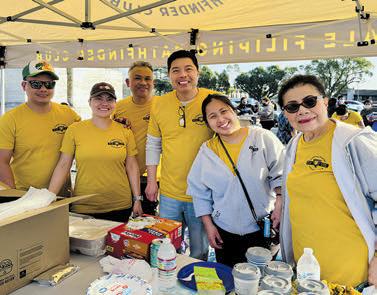
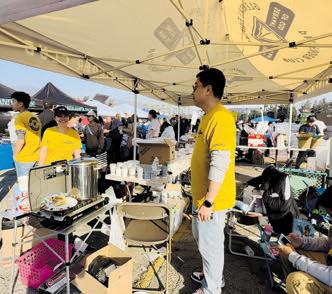
The recent wild res in Los Angeles caused signi cant devastation, altering both the landscape and the lives of many residents.
Intense flames engulfed vast areas, creating heavy smoke that obscured the skies. Entire neighborhoods were left in ruins, displacing hundreds of families who had to evacuate with minimal belongings. The Filipino community was particularly affected, as many lost their homes and treasured memories in the blaze.
In the aftermath of the fire, the atmosphere was characterized by a mixture of grief and uncertainty. Shelters sprang up, providing refuge for those displaced, while the faces of many reflected exhaustion coupled with a sense of hope. Amid this devastation, a strong sense of community emerged.
Filipino organizations, local leaders, and volunteers united to offer support, organizing donation drives, preparing meals, and providing emotional assistance to those in need. This outpouring of support showcased the resilience
of the community, embodying the Filipino spirit of ‘bayanihan’—helping one another selflessly in times of crisis.
One notable group involved in the relief efforts was the Glendale Filipino Pathfinder Club, a church organization known for its outreach programs. Within hours of the wildfire spreading, they established a relief tent at Santa Anita Park in Arcadia, California, serving as a vital resource for evacuees. Their tent offered food, water, clothing, and first-aid supplies, with members working diligently to provide emotional support to families grappling with the loss of their homes.
Icus Galang, a member of the club, emphasized the cultural significance of unity during crises.
He said, “Filipinos know how to come together, especially during times of crisis. Bayanihan is at the heart of our culture—it means helping one another without hesitation.”
Additionally, the social media-driven group Socal Filipinos played a pivotal role in connecting community members, compiling and sharing a list of GoFundMe pages for affected families. Their efforts were crucial in directing donations and amplifying the voices of those in need.
Grassroots organizations, such as Migrante SFV and Anakbayan SFV, also mobilized to conduct independent relief operations. Volunteers distributed hygiene kits, groceries, and clothing in neighborhoods with significant Filipino populations to ensure that vulnerable families received necessary aid.
As Los Angeles begins its recovery process from the wildfire, the commitment of the Filipino community to support one another stands out as a beacon of hope. While the fires have left visible scars on the landscape, the generosity and warmth of the Filipino spirit are essential in healing the emotional wounds of those affected. This communal resilience illustrates that with love and dedication, no challenge is insurmountable when individuals come together.
For those interested in supporting or volunteering, information can be found on the SocalFilipinos social media platforms on Instagram and Facebook. The path to recovery may be lengthy, but with the ongoing efforts of these dedicated organizations, it is anticipated that Los Angeles will emerge stronger in the aftermath of this crisis.
BY CRISTINA DC PASTOR
Aillen ‘Ai’ Aromin’s migration from Aurora province in the Philippines’ northern region to New York City where she now runs a restaurant is an engrossing story of grit, grace, and gratitude.
At age 7, she was cooking farm plants and vegetables for the family while her parents worked the rice fields. The eldest sibling, Ai is ‘ate’ to four sisters and a brother.
“Mahilig ako magluto. Basta gulay na dahon- dahon iluluto ko,” laughed Ai when interviewed by The FilAm. “Sa pugon lang kami nagluluto gamit ang uling at tuyong mga kahoy. Ang bahay namin sa Aurora province ay nasa gitna ng bundok, malapit sa ilog at dagat.
At age 15, her family relocated to her father’s hometown in Science City of Muñoz, Nueva Ecija where Ai went to high school. In Manila, she went to the Philippine Women’s University where she majored in Bachelor of Science in Tourism Management. She believes that whoever you become in life is what you have made of yourself. If you went to school, chances are it will usher in opportunities and land you gratifying and good-paying jobs. It has been that way with Ai.
After college, she went to Virginia in 2014 to intern with a luxury country club. Feeling unfulfilled, she left after a couple of months, went to New York City where her grandfather, Ramon Dizon, took her in and offered to get her foot in in the City of Dreams. Ai worked in an advertising agency, a dental office, and took on other jobs until the idea of opening a restaurant specializing in traditional Ilocano dishes triggered a lightbulb moment. Today, Filipiniana Restaurant & Catering in Elmhurst in Queens, considered a newbie in the borough’s tough FilAm restaurant scene, is holding its own against its more seasoned, more well-known rivals. Five years since it opened, Filipiniana

has positioned itself as a pit stop for those craving Ilocano dishes such as Kare Kare, Papaitan, Dinakdakan and Dinuguan.
As a young girl, 7 or 8 she stressed, she was already before a charcoal-fired palayok and experimenting with cooking. Over time she was left on her own and began to develop her own recipes which she unveiled in her NYC restaurant. Her Dinuguan tastes the sourness of fresh tamarind not vinegar. Her Kare Kare uses only the most succulent oxtail. Her Papaitan makes generous use of bile but without the acrid taste.
“Basta mahilig lang akong makialam sa kusina. I studied Hotel Restaurant Management for two years in Central Luzon State University pero hindi ko naman tinapos ang kurso. Kaya hindi naman talaga ako chef. I learned cooking on my own,” she said proudly.
Filipiniana, with a staff of six people, is a tiny spot in the vast and lengthy expanse of Queens Boulevard. It has two benches and a high table by the window. Food is turo-turo style from a glass shelf and served piping hot. Catering is a big draw, and Filipiniana has catered major events at the Philippine Consulate and community organizations.
Through her accomplishments, Ai has not forgotten family. She petitioned for her parents to come to NYC so her father could undergo surgery for a heart condition.
“That’s my biggest accomplishment,” she said.


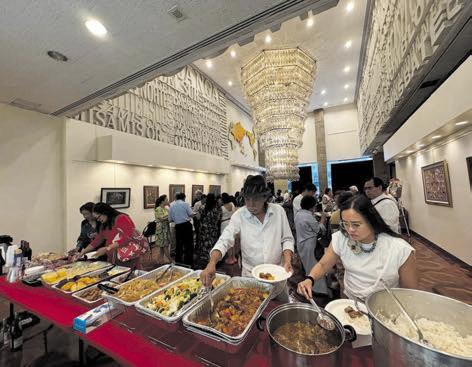
She has sent all her siblings to school, even the friend of her sister who is studying to be a nurse.
“I don’t know why I’m sending to school someone who is not even related to me,” she chuckled. “Maybe I see myself in her and her perseverance to live her dreams.”
Just grateful, Ai is lucky to have people who took her under their wings and nurtured her until she is ready to take flight.
On October 2023, Ai married Justin Lam, a U.S.-born Chinese American who works as a UX Designer for J.P. Morgan Chase. The two met at the advertising agency where she worked. They have known each other for nine years before they wed. Their first-born, Jaiden Kai, is a happy and healthy 9-month-old who got his father’s looks specially his eyes.
In a reflective pause she said, “I’m grateful to God that I’m here in the ‘City that never sleeps.’ I didn’t have too much of a hard time adjusting because I’ve always been an independent person.”
As a restaurant owner, she has had her share of disappointing hires where some of her sta would leave after they had been trained. “That’s life. People come and go specially in this kind of business. You just need to learn how to set boundaries.”
“Sometimes I get lonely and homesick. I miss my life in the Philippines,” she said.
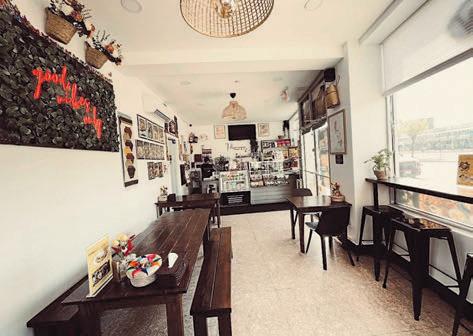
The restaurant on Queens Boulevard

| Until February 15
World Premiere of Andrea Thome’s modern translation of Shakespeare’s ‘Cymbeline’ Presented by the National Asian American Theatre Co. Lynn F. Angelson Theater 136 East 13th Street NYC

| Until April 8
Application period for the PNAA Nurse Excellence Award
Contact the Philippine Nurses Association of America, Inc.
| February 7 & 8

| March 1
New York Fashion Week by Steadfast Creative Arts Production With Mrs. Universe Shreyaa Sumi
Contact Grace Steadfast on Facebook
| February 12
Films to See Before You Die featuring ‘Moral’ directed by Marilou Diaz-Abaya 1982
Four Filipina women navigate friendship and adulthood against a backdrop of martial rule.
Asia Society
725 Park Avenue at 70th Street NYC
Tickets are $8 for Asia Society members; $15 for non-members, and may be purchased at AsiaSociety.org/NY or by calling the Box O ce at 212-288-6400

| February 15
Valentine’s Dinner Dance and Show for the construction of Little Manila Park
St. John Baptiste Auditorium 173 East 75th NYC
Contact Lili 347-844-8332
Deadline to apply for International Contest for Minority Artists eme: Belonging, Place and Loss In partnership with the nongovernmental organizations Minority Rights Group and Freemuse, and the City of Geneva Go to www.minorityrights.org
| March 8
PIDCI Grand Marshal Ball Da Mikelle Palazzo 69-02 Gar eld Avenue
Queens NYC
| April 13
PIDCI Diwa at Ginoo ng Kalayaan
Doubletree Newark 128 Frontage Road Newark, N.J.
| April 26
1st Annual Maharlika golf outing Holbrook Country Club 700 Patchogue-Holbrook Road Holbrook, N.Y.
Contact Ronnie Ocampo 516-582-7309
| April 26
Filipino American Association of Engineers (FAAE), Inc. 30th Annual Gala and Induction of

O cers
Terrace on the Park 52-11 111th Street
Queens NYC
| May 3
PIDCI Mrs. Kalayaan Ball
Astoria Manor 25-22 Astoria Boulevard Astoria, NYC
| May 23 to 26
UNIFFIED Educators
International Summit New York City
Contact UNIFFIED

| May 24 to 25
Maharlika Memorial Day Cup
Spooky Nook
75 Champ Blvd.
Manheim, PA
Contact Ronnie Ocampo 516-582-7309
| June 1
Philippine Independence Day Parade Madison Avenue Manhattan NYC
| July 16 to 20
46th Annual Convention of the Philippine Nurses Association of America
The Westin Book Cadillac Detroit 1114 Washington Boulevard Detroit, MI

| August 23
PIDCI Maria Clara Ball
Astoria Manor 25-22 Astoria Boulevard
Astoria, NYC

| October 3 to 5
Philippine Nurses Association of America, Inc.’s 22nd Eastern Region Conference with the theme “Impacting Lives, In uencing Change”
Live Casino & Hotel Maryland 7002 Arundel Mills Circle Hanover, MD
| Oct 17 to 18
UPAA in America’s 23rd Grand Reunion and Convention Westin Galleria 5060 W Alabama Street Houston, TX
| October 25
TOFA Las Vegas | ATBP
Now open for applications: Ginang Filipinas America New York Contact for more information: 347-220-5230




Kain na Tayo, an idea that originated from members of the 2023 Tayo Fellows cohort, seeks to improve heart health in our communities through healthy culturally-tailored recipes. For Filipino Americans, having a nutritionally focused approach to food can help curb the staggering issues impacting the community:
• 1 in 3 Filipino Americans su er from heart disease
• High blood pressure a ects 3 in 5 Filipino Americans
• Filipino Americans have a 70% higher risk of developing diabetes compared to other Asian Americans
Kain na Tayo aims to address di cult topics that a ect our health, use Kwentuhan (talk story) to share our personal stories, and build community.
“For many Filipinos, food and family are the center of our lives. Whether it’s a recipe for your Lola Tessie’s Kaldereta or your Ate Geri’s Tofu Sisig, health habits are passed down through our shared experiences at the dinner table,” Tayo Medical and Public Health Advisor Dr. Melissa Palma said. “Caring for our families doesn’t just
mean cooking how we always did back home, but also expanding our food knowledge of heart healthy ingredients and techniques that promote health and wellness with a tunay na Pinoy taste.”
“This project is deeply personal to me and everyone else who contributed. Many people in my families have heart issues, including my mom. I worked on this project for my mom, my family, and my community,” said Janeca Dimen, a 2023 Tayo fellow about her experience working on the Kain na Tayo series.
The videos were produced by 2023 Tayo fellows Janeva Dimen, Alexandra Reyes and Angela Rose David. Rhyz Valmonte contributed to the filming of the videos. Registered Dietitian John Canlas, RD advised on the healthy recipes and the videos were edited by Ray Rivera. The project advisor was Melissa Palma, MD, MPH.
Tayo, a project of the Filipino Young Leaders Program (FYLPRO), that collects data, fosters partnerships, publishes culturally relevant insights, and develops leaders to create an equitable and sustainable future. For more information, visit tayohelp.com.




“At age twelve, Paula confronts a school bully who folded easily. Her US Marine father has taught her courage amidst challenges, her school-teacher mother has instilled in her compassion with cleverness. Then she meets a senator who, growing up, has faced enormous life adversities and humbly bears those same traits. An unlikely friendship ensues.ˮ

Gene P. Del Carmen




























BY CRISTINA DC PASTOR
Deirdre Levy, a K-2 special education teacher, has announced her candidacy for mayor of New York City. This pits her possibly against former Governor Andrew Cuomo, who is reportedly mulling a decision to run, and re-electionist Eric Adams in the June 24 Democratic primary.
Cuomo resigned in 2021 over sexual misconduct charges, while Adams’s political profile is plagued with federal corruption allegations. Levy, a relatively unknown politician, ran for the position of council member for District 35 or Central Brooklyn. She said her parents –Steven Levy, Esq. and retired nurse Thelma Samson Levy from San Carlos, Pangasinan — have always been supportive seeing how public service is a fulfillment of her dream.
Filipinos contacted by The FilAm said they have not heard of Levy’s name.
With over 12 years of experience working with children with autism, emotional disabilities, and speech impairment, Levy said she believes every New Yorker deserves an equitable chance to succeed—regardless of background or ability. As a working-class teacher, she said she “reports to her students—not to big businesses or corporate interests.”
According to a statement, her decision to run for mayor stems from her desire to build a city where all residents, from students to workers, can thrive.
“Our city is filled with incredible talent, but too many people are held back by systems that don’t fully support them," she said. “As a teacher, I know how essential it is to recognize, nurture, and invest in every individual's potential. That’s what I want to bring to the mayor's office.”
Levy’s campaign says it prioritizes the following:
--Equity in education: Expanding access to quality education, especially for children with special needs, and ensuring every student, regardless of their background, has the resources and support they need to succeed.
--Inclusive communities: Creating safe, supportive, and accessible spaces for all, including those with disabilities, while tackling mental health challenges and offering adequate resources for families.
--Working-class representation: Being a mayor who reports to the people, not corporate donors.

‘A desire to build a city where all residents can thrive.’
Her campaign is also fueled by the NYC Campaign Finance Program, which matches small-dollar donations—making every contribution go further. A $10 donation can become $80, and $100 can turn into $800.
Lawyer and immigration rights advocate Lara Gregory, who came to know Levy during the pandemic, said, “Deirdre Levy running for mayor brings a strong message for everyone. Whereas other women, or men, for that matter won’t, her message is ‘I’m qualified and I’m stepping in the ring.’ It’s time that AAPI Filipinos see themselves qualified to be in elected leadership roles in city government,” she said.
Levy raised funds for food delivery to frontliners during the pandemic in partnership with Kabisera coffee shop. The initiative came to be known as Project Barkada.
“It’s important to support Deirdre so our community can be seen as a political force,” added Gregory.
A FilAm leader who wished to remain anonymous said, “I wish her luck. It would be interesting to see what her agenda is.”

Filipino food lovers of New York are in grief.
We lost nearly half a dozen restaurants in the last three years, Maharlika, Jeepney, and on Aug 30 Purple Yam, the illustrious heir to Cendrillion, served its last plate of Ukoy. Before that, Ugly Kitchen was the first of the big leagues to go.
Two distinguished chefs spoke to Makilala TV recently and deciphered what’s going on.
Chef Aris Tuazon and chef Joel Javier couldn’t be more opposite in their business trajectory. Aris has been involved with many restaurants since 2001 starting as a dishwasher in a midtown restaurant. Grill 21, which opened in 2005 is by now the longest running Filipino eatery in Manhattan. This was his first FilAm restaurant. In the last three years, he founded Gugu Room, a Filipino-Japanese sake shop, and 87 Ludlow tapas joint in Lower Manhattan.
Joel, on the other hand, has been doing something totally opposite. He was a chef for many years for a Michelin rated restaurant until he decided in 2015 to introduce Flip Eats, a pop up dining experience where total strangers share a table in his Brooklyn home and partake of Joel’s small bites. Sometimes, he would recreate the experience in a restaurant or a private home. It’s been pop up all the way for Joel, never a permanent location. His wife Rachel Javier manages the business with him.
Is high rent the biggest killer of restaurants?
Aris believes it is only one of the reasons.
“Rent has always been an issue for many businesses especially nowadays. Before, that’s the only thing you have to worry about but now inflation is here. We lost numerous Filipino restaurants across the city and each of them played an important role and we have learned a lot from them. So there’s rent, labor and everything now is totally di erent especially the ingredients.”
Joel admitted rent is “definitely one of the reasons” he has stayed away from the brick and mortar business. A close second is life-and-work balance.
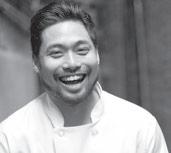
“A lot of years have gone by and a lot more people are realizing how much time is involved in opening a restaurant or successful restaurant at that,” he said. “Especially nowadays with the age of scrutiny and Instagram, there is more to a restaurant than good food now. You have to know how to attract people to come to you. There are always new places opening up every day, new trends. How do you compete with that?”
The reason Flip Eats has endured over the years and has become a successful word-of-mouth experiment is because of “customization.”
Joel explained: “It’s mainly a private chef concept. I could create your type of dinner for you through customization. So I could go to your place, cook dinner, however you want cocktail hour, bu et whatever you want. We will work with you we will ask your favorite dishes then we will create a menu based on what really works for our client. It’s something we o er that I think a lot of places don’t.”
He continued, “Some people are open to di erent restaurants because they get bored with one food. They create a menu that is successful and the team knows how to do it and that’s it. Then maybe you’ll say I’m into Mexican food. Then maybe you’ll say oh I’ll open a Mexican restaurant so that’s how it works because you cannot just change the concept of the restaurant once it is established. It is what it is.”
The gentlemen were asked if the pandemic has forced restaurant owners to change strategies or to simply ride it out.

“With the pandemic its everyone’s first time,” said Aris. “We don’t know what’s going to happen or what we are dealing with. We had to adapt and create innovation. Like what are the new expectations of these new customers.”
Another trend that was totally unexpected was that “everybody learned to cook during the pandemic,” he said further. “So they realized you didn’t have to go to a restaurant. You can also order online. So many things evolved. But it’s part of the game. You just have to keep reinventing.”
When Maharlika, Jeepney, and Purple Yam closed, the first thing that came to Aris’s mind was “change.”
“We have all learned from what they did and what they have done and from there you really just have to do things (and wonder) what would be the new demand for marketing the trends.”
Joel believes that when one restaurant closes, another one opens.
He said, “Restaurants are closing for sure. It means new ones will open. And those restaurants that talk about legacy really gave permission to a lot of this next-generation to kind of see what Filipino food could look like and how businesses could run and how Filipinos could survive in a place like New York City.” -- Cristina DC Pastor
BY CRISTINA DC PASTOR
On December 30, 2024, the U.S. Consulate in Tijuana, Mexico issued the famously ‘undocumented’ Jose Antonio Vargas a (d)(3) Waiver O Visa, a purely discretionary visa usually given to individuals “balancing social and humanitarian considerations,” according to the USCIS.gov website.
“My O visa was approved… after 31 years, four months and 2 8 days of living in the United States,” he said in a video message. “I was finally documented.”
As explained by Vargas, his O visa is not a green card.
“It does not make me a permanent resident, does not even put me on the path to U.S. citizenship. But it can be renewed and which I hope to do,” he made clear.
His journey to a legal status started on Christmas day when he and three friends went on an anxiety-riddled trip to Mexico to apply for the waiver. They did not know what to expect. When they got there, he said, “Everyone thought I was Mexican because of my name” and also because of his immigration status.
For the first time in 31 years, he left U.S. territory to cross the border. Vargas came to the U.S. on August 3, 1993, unaware he had no legal papers. He was 12 years old.
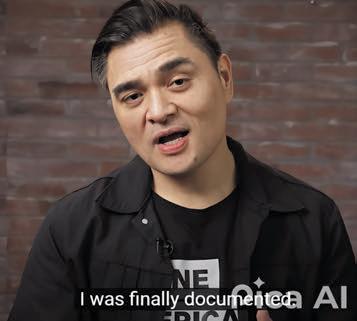

He faked his status and checked the box “citizen” when applying for a job as a copy boy in a newspaper office. He won a Pulitzer Prize reporting with an investigative team for the Washington Post. He revealed he was undocumented
in a June 2011 essay in The New York Times, opening up his life to a plethora of possibilities. He founded Define American, became an immigrant rights advocate, a filmmaker, a book author, an entrepreneur, a Broadway producer.
“We arrived in Tijuana at 9 p.m.,” he shared, calling to mind how it all began.
“Twelve hours later I was scheduled to be interviewed at the U.S. Consulate. I didn’t sleep. I couldn’t sleep. I’m not sure nervous is an enough of a word to describe what I was feeling. I came to the consulate with a stack of documents -- the taxes I paid, my college transcript from San Francisco State University, a list of my accomplishments, letters about my character from my choir teacher, my high school teacher and superintendent, my cousin and best friend. No piece of technology including an iPhone was allowed to bring inside the building.”
Facing the consular o cer, he was asked, “If your waiver is denied where will you go?” He replied he has a family in the Philippines or that he could possibly find employment opportunities outside of the U.S.
“We stood the whole time,” he said.
“Toward the end as he (consular o cer) gathered my documents he said you’ve been living in the U.S. for 30 years. Why would we now believe you will comply with the terms of this visa? Will you leave after the terms of this visa? The visa expires in three years. I took a deep breath and replied. ‘I could have stayed in the U.S. without status. However I’m 43 years old and want to show the U.S. government, the government I’ve been paying taxes to a country where I built my life that I’m interested in following immigration laws. I intend to honor this visa.’”
“It felt exciting and scary,” said Vargas. “Enlightening and disorienting.”
He thought that whatever happens should the waiver be denied, his work of telling the story of how “migrants are reshaping and redefining the western world,” continues.
“My work is global,” he said.




































